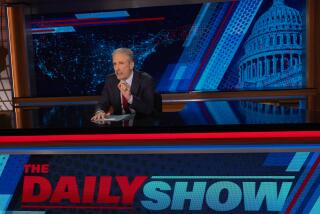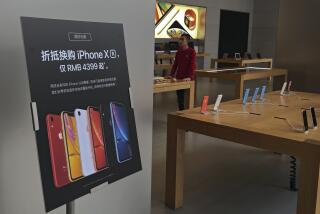Apple’s CEO steps out of Steve Jobs’ shadow
- Share via
After tiptoeing out of the long shadow of Steve Jobs this last year, Apple Inc. Chief Executive Tim Cook took a giant leap into the spotlight this week.
In a kind of transparency rarely practiced by his enigmatic predecessor, Cook granted a pair of candid interviews that underscored the difference in both style and substance between the two men.
They also served as the latest sign of how Cook has embraced the Apple motto to “Think Different” as he methodically and quietly reshapes the culture and business of the company he inherited.
“He’s the kinder, gentler Apple,” said Carl Howe, a longtime Apple analyst for market advisory firm International Data Corp.
“This is a big, multinational corporation. I think Tim has done a better job of recognizing that,” Howe said. “Jobs could remember when it was just three guys in a garage. When you get to be one of the largest companies in the world, you need a different skill set.”
Cook has dramatically expanded the pace of Apple’s product introduction, rolling out in the last 60 days the iPhone 5, a new iPad, upgrades to the iPod line and the new iPad Mini at a size that Jobs once dismissed as too small.
But Cook also addressed the tone of Apple when he restructured management by dismissing an executive who had been a favorite of Jobs to emphasize collegiality over confrontation.
Such a break has drawn some applause. But it has not been without risks, analysts said. And there have been stumbles, as witnessed by the Apple Maps controversy that raised questions about whether the Cupertino, Calif., company’s design instincts had weakened without the heavy hand of Jobs to guide them to perfection.
Analysts also acknowledge the general concern that Cook still may not have the chops to push more new products down the pipeline -- electronics that change the way people work and live.
In recent weeks, Apple’s stock has experienced extraordinary volatility amid questions about its slipping market share and prospects for growth. Since reaching an all-time closing high of $702.10 in September, shares have fallen nearly 25%, closing Friday down $13.99, or 2.6%, at $533.25. . It has lost a staggering $159 billion in market value.
Still, in an interview with Bloomberg Businessweek, Cook insisted that the blessing to change direction and chart his own course came from Jobs himself in the weeks before the company’s co-founder died last year.
“He goes, ‘I never want you to ask what I would have done,’ ” Cook recalled. “ ‘Just do what’s right.’ He was very clear.”
Longtime Apple observers said Cook has taken that advice to heart, though at his own pace.
“He didn’t simply want to start as CEO by making radical changes,” said Regis McKenna, the Silicon Valley marketing legend who began working with Apple in its earliest days. “He doesn’t do precipitous acts just to be different. He is thoughtful and methodical. He does things because he thinks they’re right.”
The latest and most surprising change that resulted from Cook’s deliberative process was revealed Thursday when he announced in the interviews with Bloomberg and NBC News’ “Rock Center With Brian Williams” that Apple intended to move some of its manufacturing back to the United States.
Cook said the company would invest $100 million to begin building some Mac computers domestically, though he didn’t specify the location. Apple assembles some products in the U.S., but it doesn’t disclose how many or where.
Just as remarkable to many observers were the reasons: Cook said he believed that the company did have an obligation to play a social role above and beyond the goal of fattening the bottom line.
“I do feel we have a responsibility to create jobs,” Cook told Bloomberg. “I don’t think we have a responsibility to create a certain kind of job, but I think we do have a responsibility to create jobs. I think we have a responsibility to give back to the communities, to pick ways that we can do that.”
Tim Bajarin, an analyst at Creative Strategies, said the amount of manufacturing moved to the U.S. was likely to be small. Though it might bolster Apple’s reputation, he said, that probably wasn’t the main motivation for Cook.
Still, Cook’s comments were unlikely ever to have come from Jobs, who bristled at such notions as the company’s social impact and charitable giving.
One of the first big departures for Cook was the way he handled mounting criticism of the labor practices of Apple’s overseas manufacturing partners, particularly the Foxconn plants in China that faced accusations of overworking and underpaying sometimes-underage employees.
After touring Chinese factories, Cook raised the standards that partners were expected to meet. He signed on with the Fair Labor Assn. to conduct independent inspections of Apple suppliers.
Cook’s experience building and running Apple’s supply chain put him in closer touch with those who make the company’s products, Howe said. The creation of Apple’s world-class manufacturing system had been his crowning achievement.
But Cook’s changes haven’t gone far enough or fast enough to suit many critics. Taren Stinebrickner-Kauffman, executive director of corporate responsibility group SumOfUs, said the return of some manufacturing to the U.S. was too small to do anything more than buff Apple’s image.
“It does not change the fact that their entire business model relies on the exploitation of hundreds of thousands of Chinese workers,” she said.
“Apple has an obligation, and Tim Cook personally has an obligation, to address this problem. He knows better than anyone how these people are treated since he was in charge of the supply chain.”
Jobs hired the 6-foot-1, soft-spoken native of Alabama in 1998 from Compaq Computers. It was a big risk at the time because Apple was still struggling for survival. But Cook told Jobs’ biographer, Walter Isaacson, that he couldn’t resist the chance to work with the dynamic Jobs.
“Five minutes into my initial interview with Steve, I wanted to throw caution and logic to the wind and join Apple,” Cook told Isaacson. “My intuition told me that joining Apple would be a once-in-a-lifetime opportunity to work for a creative genius.”
Cook set about overhauling Apple’s manufacturing and supply chains, which were in disarray. He is the architect of a system that is the envy of gadget makers around the world, and was a crucial part of Apple’s revival. But it was also a shift that relied heavily on outsourcing almost all of Apple’s manufacturing overseas.
When the temperamental Jobs grew so sick he could no longer run Apple last year, he pushed the board to make the more mellow Cook his successor.
Jobs told Isaacson he did have one reservation about Cook: “Tim’s not a product person, per se.”
That concern remains central to those who worry about Apple’s future.
“Can Tim Cook move fast enough to use the technology in Apple’s labs to avert a disaster? That’s the big question he hasn’t had to answer yet,” said Vivek Wadhwa, vice president of academics and innovation at Singularity University in Silicon Valley.
In the short term, questions about Cook’s product leadership haven’t stopped him from accelerating the pace of new product launches and upgrades this year, another departure for a company that boasts of focusing on just a few products.
And it seemed to push Cook’s supply chain to the limit when the company had to delay shipments of its new iPhone 5 this fall because it couldn’t meet the demand.
The company also faced controversy when it abruptly replaced Google Maps on the iPhone with a new Apple Maps app that users criticized as being weak and inaccurate. Cook publicly apologized, but Apple fans fretted that this was a larger sign that Apple had lost its design mojo and the eye for perfection demanded by Jobs.
In the wake of the maps uproar, Cook delivered another shock in October when he announced that Scott Forstall, senior vice president of iOS Software at Apple, was out. Forstall had been a Jobs favorite, but was also reportedly similar in personality to his boss: confrontational and abrasive.
Howe said the best way for Cook to calm investors was to continue to deliver stellar results. But Howe said it’s also important that investors and customers continue to get to know the man who carries the burden of Apple’s success.
And that means that Cook, who once told Isaacson he’d “prefer my name never be in the paper,” will have to continue to embrace a larger role as a public figure.
“I think we all miss Steve,” McKenna said. “He was such an unusual dynamic character that it seemed that Tim would always be in his shadow.
“But when you start running a billion-dollar company, you have a responsibility to meet with analysts, journalists and a public to keep the company’s image alive and strong,” he said. “Tim Cook is his own person and we’re all starting to finally see that.”
--







